Introduction
Birds, with their vibrant colours and melodic songs, are a vital part of our ecosystem. However, they face numerous challenges that threaten their survival. Let’s dive into the various problems faced by birds in today’s world.
Table of Contents
ToggleWhat are the Problems Faced by Birds?
1. Habitat Loss
Habitat loss is possibly the most significant threat to bird populations. As humans expand their footprint, natural habitats are cracked, leaving birds with fewer places to live, breed, and find food.
How We Can Help the Birds
· Support habitat restoration projects.
· Create bird-friendly spaces with native plants.
· Advocate for protected natural areas.
· Preserve existing habitats through conservation.
· Reduce urban sprawl and deforestation.
2. Climate Change
Climate change is another pressing issue affecting birds. Changes in temperature and weather patterns disturb their natural behaviours and surroundings.
How We Can Help the Birds
· Reduce your carbon footprint.
· Support renewable energy sources.
· Advocate for climate action policies.
· Participate in bird monitoring programs.
· Educate others about climate impacts on birds.
3. Pollution
Pollution in various forms poses a significant threat to birds. Chemicals in the air, water, and land can have shocking effects on avian health.
How We Can Help the Birds
· Reduce plastic use and waste.
· Choose eco-friendly household products.
· Support clean water initiatives.
· Participate in local clean-up efforts.
· Minimize the use of harmful pesticides.
You May Also Like: The 21 Ugliest Birds: Nature’s Strange Creations
4. Invasive Species
Invasive predators such as cats and rats can innocently reduce bird populations by preying on eggs, chicks, and adult birds. Birds on islands are particularly in danger, as they may lack natural defences against these predators.
How We Can Help the Birds
· Keep pets indoors to protect birds.
· Support invasive species control programs.
· Plant native species in your garden.
· Educate others about the impacts of invasive.
· Report sightings of invasive species to authorities.
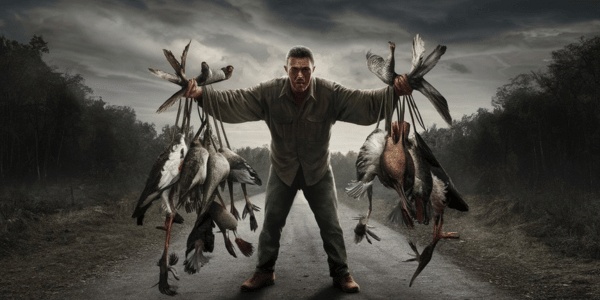
5. Hunting and Poaching
Hunting and poaching remain significant threats to birds, mostly in areas where they are hunted for sport or illegal trade. The illicit trade of birds, particularly colourful species, continues to flourish. Birds are caught and sold as pets, leading to population failures in the wild.
How We Can Help the Birds
· Support anti-poaching laws and enforcement.
· Avoid buying wildlife products.
· Educate others about hunting impacts.
· Promote wildlife conservation programs.
· Support sanctuaries and rehabilitation centres.
6. Collisions with Man-made Structures
Modern arrangements pose numerous threats to birds, with crashes being a major cause of death. Birds often strike buildings and windows, especially in urban areas. Reflective glass can be hazardous, as birds cannot see it as a barrier.
How We Can Help the Birds
· Install bird-safe glass and window treatments.
· Advocate for bird-friendly building designs.
· Use window decals to reduce collisions.
· Promote safe flight paths for birds.
· Educate others on preventing bird collisions.
You May Also Like: Birds of Prey: Meet the Mighty Raptors
7. Light Pollution
Artificial lighting affects birds’ natural behaviours, primarily for nighttime species and travelling birds. Light pollution can affect with birds’ nighttime activities, such as feeding and breeding. It can also disturb their sleep patterns, leading to increased stress and health issues.
How We Can Help the Birds
· Reduce outdoor lighting.
· Use bird-friendly lighting fixtures.
· Participate in “Lights Out” programs.
· Advocate for light pollution regulations.
· Educate on the impacts of light pollution.
8. Food Scarcity
Changes in the surroundings and human actions can lead to food shortages for birds. Pollution, climate change, and home loss can reduce the populations of insects and other natural prey that birds rely on for food.
How We Can Help the Birds
· Provide and maintain bird feeders.
· Plant native plants for natural food sources.
· Avoid pesticides and herbicides.
· Support sustainable agriculture.
· Educate on providing bird-friendly environments.
9. Disease and Parasites
Birds are liable to various diseases and parasites, which can have disturbing effects on populations. Diseases such as avian flu can spread rapidly among bird populations, leading to high humanity rates. Close contact with domestic poultry can improve the spread of these diseases.
How We Can Help the Birds
· Keep bird feeders and baths clean.
· Support bird health research.
· Monitor bird health and report issues.
· Promote hygiene in bird habitats.
· Educate on preventing disease spread.
You May Also Like: Top 10 Birds with Long Legs
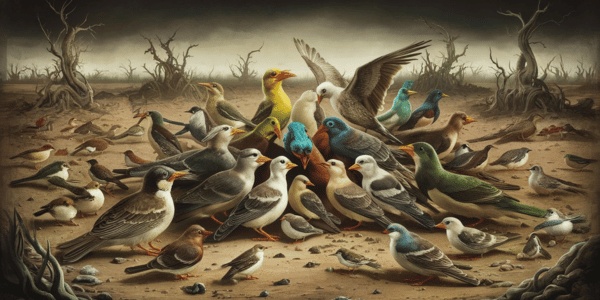
10. Loss of Biodiversity
The decline in bird populations disturbs the overall biodiversity of environments, disturbing their balance and health. Birds play vital roles in ecosystems, such as pollination, seed dispersal, and pest control. A failure in bird populations can lead to inequities, affecting other species and ecosystem functions.
How We Can Help the Birds
· Support diverse habitat conservation.
· Promote sustainable farming practices.
· Advocate for ecosystem protection.
· Protect endangered species.
· Educate on the importance of biodiversity.
11. Climate-induced Habitat Changes
Climate change leads to long-term changes in surroundings, further menacing bird populations. For birds that trust in polar areas, the melting of ice caps reduces available breeding and feeding grounds, impacting their existence.
How We Can Help the Birds
· Support habitat restoration projects.
· Participate in reforestation efforts.
· Advocate for climate adaptation strategies.
· Promote climate resilience in conservation.
· Educate on climate impacts on habitats.
12. Noise Pollution
Noise pollution from urban areas, transportation, and industrial actions disturbs birds’ message and behaviour. Birds depend on words for communication, including mating calls and alarms. Noise pollution can cover these sounds, making it difficult for birds to interact and mate successfully.
How We Can Help the Birds
· Reduce noise in natural areas.
· Advocate for quiet zones in critical habitats.
· Support noise pollution regulations.
· Promote awareness of noise impacts.
· Encourage the use of quieter machinery.
You May Also Like: Small Southwestern Birds of Prey
13. Conservation Efforts
Despite the several challenges, conservation efforts are being made to protect and preserve bird populations. Replanting, wetland restoration, and the creation of protected areas help to restore and maintain vital homes for birds. These efforts aim to provide safe environments for breeding, feeding, and relocation.
How We Can Help the Birds
· Support bird conservation organizations.
· Participate in bird counts and monitoring.
· Advocate for wildlife protection laws.
· Promote conservation education.
· Volunteer for conservation projects.
Conclusion and Call to Action
Birds face a mass of challenges in the modern world, from home loss and environmental change to pollution and invasive species. Yet, through determined saving efforts, there is hope for the future of these unique living beings.
We must continue to address these threats to confirm that birds can succeed for generations to come. Everyone can play a part in bird protection by supporting home restoration projects, decreasing pollution, and raising awareness about the issues birds face.
FAQs: What are the Problems Faced by Birds?
Q1: How does urbanization impact bird populations?
Urbanization leads to home loss and division, making it difficult for birds to find suitable places for nesting, feeding, and breeding. Moreover, urban areas pose risks of crashes with buildings and exposure to pollution.
Q2: What are some examples of invasive species that threaten birds?
Invasive species like local cats and rats can prey on birds and their eggs. Invasive plant species can also change homes, making them less suitable for native birds.
Q3: How can climate change affect bird migration?
Climate change can change the timing and routes of bird journeys by affecting the environmental signals birds rely on. Random weather and changing temperatures can lead to mistimed migrations and reduced existence rates.
Q4: What are some conservation efforts to protect birds?
Conservation efforts include home renewal projects, legal defences like the Migratory Bird Treaty Act, and public alertness movements to promote bird-friendly practices.
Q5: How does plastic pollution harm birds?
Birds frequently ingest plastic remains, mistaking it for food. This can cause jams in their digestive systems, leading to underfeeding, poisoning, and death.

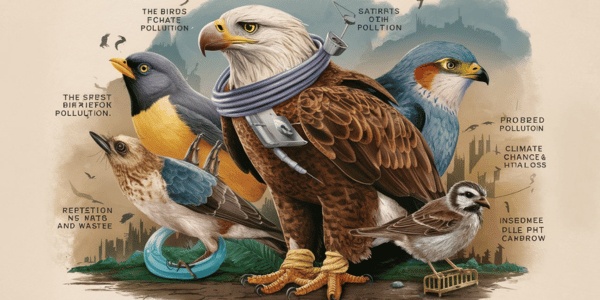





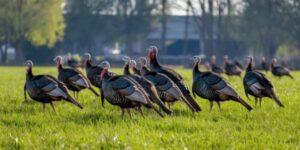

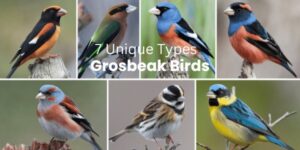


3 Responses